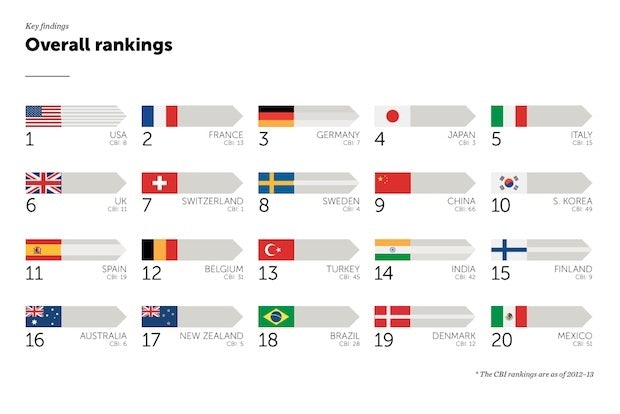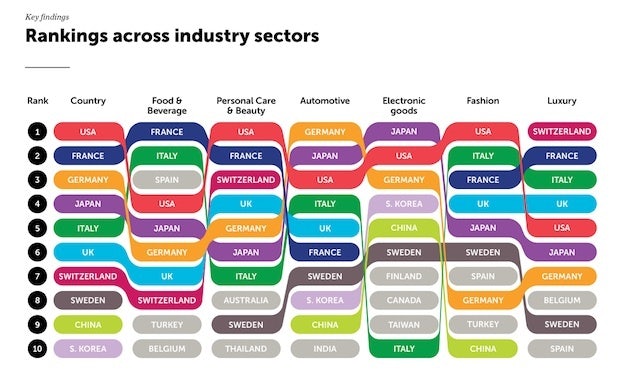
FutureBrand's rankings of the top countries of origin influencing purchase decisions. (FutureBrand)
When people hear the words “made in China”, stereotypical images of cheaply made, low-quality goods are fading faster than anyone had originally imagined.
That’s the conclusion of a new study released by brand consultancy FutureBrand, which surveyed 1,050 consumers worldwide to gauge brands’ reputations based on their country of origin. Chinese brands ranked ninth on the list of those consumers would be most likely to purchase, coming in ahead of South Korea this year.
“This is good news for China business and brands, which are shrugging off negative stereotypes, ‘cheap, low-skill, low-tech’,” said Sarah Reiter, the president of FutureBrand Asia Pacific. “Like Taiwan and Japan in previous decades, China is now shifting towards being associated with ‘modern, sophisticated, high-tech’.”
The findings of this study are vital to companies’ global branding strategies, argues FutureBrand. Even in our globalized world, the survey finds that consumers still care a great deal about what country a brand comes from. When asked about which factors were most important in driving a purchase decision, country of origin, design, and manufacture ranked second, third, and fourth on the list. They were superseded only by “safety” as a higher priority.
This year, China’s rank on the list is driven by electronics, but automotive and fashion brands are also up there. FutureBrand cites companies like Alibaba, Xiaomi, Geely, and Lenovo as major boosts to Chinese brand perception. Pride in one’s home brands may have also played a part in the results: survey respondents hailed from major emerging and mature global consumer markets, including the United States, France, Brazil, India, China, Japan, and Australia.

In order for Chinese brands to make their way further up the list, they must focus on the concept of “authenticity”, argues the report. This means a focus on values, associations, and symbols of the brand’s home country, as well as attention to which industries are associated with each country. In addition, the country’s “history, cultural values, or political-economic aspects” can also play a part in brand identity.
“Based on these insights, it is clear that China’s future challenge will be to build its own brands, not just products or corporations, that have real emotional appeal for consumers,” explains Reiter. “This means both focusing on delivering ‘authenticity’, a key driver of consumer preference, as well as understanding when, where, and how to leverage China’s unique country of origin for its own future brands.”